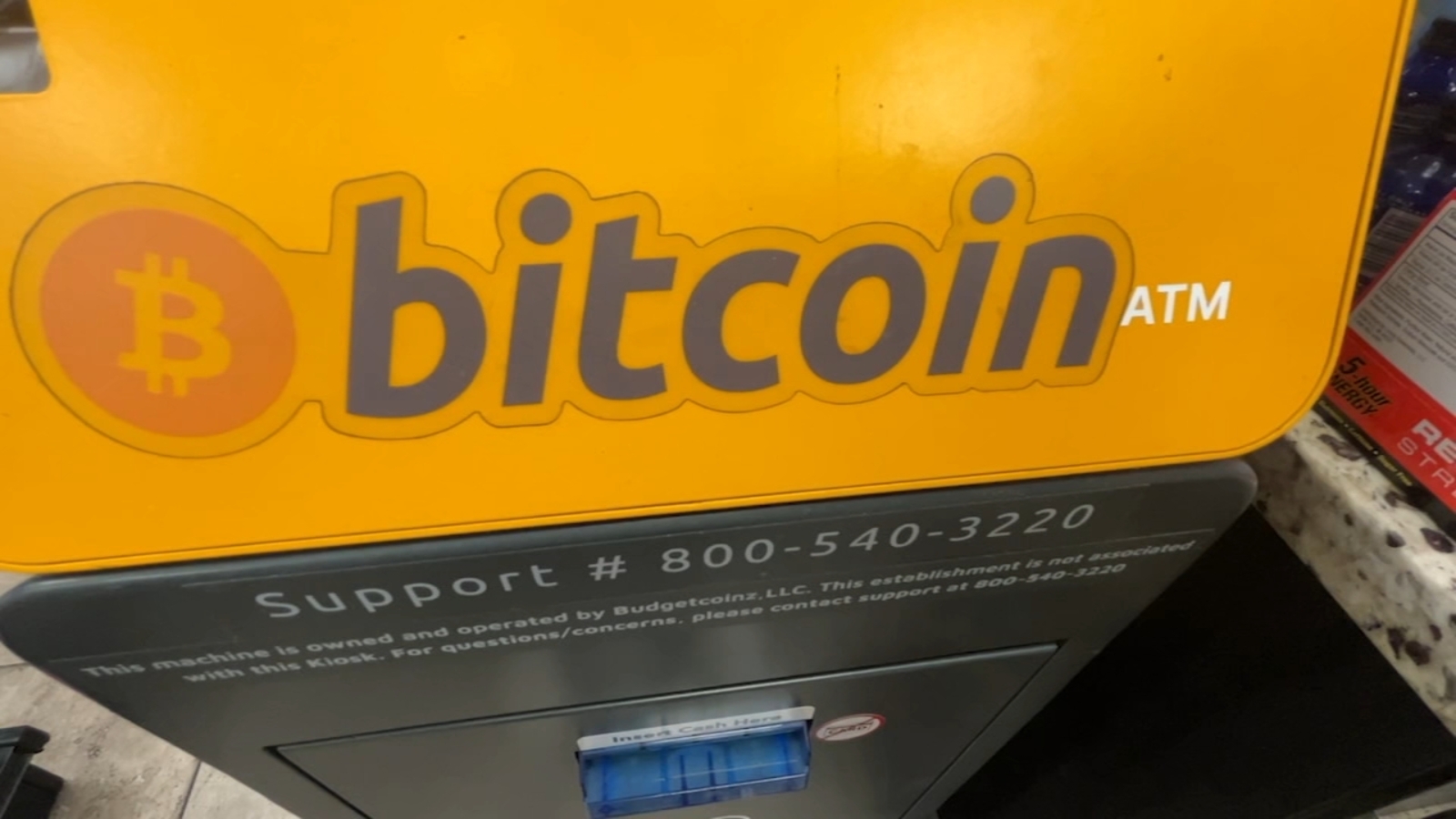SAN FRANCISCO (KGO) — Bitcoin ATMs that convert money into cryptocurrency have become a favorite tool of scammers, many of whom operate from abroad. The I-Team worked with ABC News on this investigation.
It’s the same old scams with a new twist. You’ve heard of people being lured into a fake romance or convinced there’s a problem with their computer or bank account – it’s all just a ruse to get their money back. But now the bad guys are convincing victims to deposit their savings into these Bitcoin ATMs.
RELATED: 7 On Your Side report on $50,000 crypto scam draws attention from California state officials
Jim Meduri, of San Jose, received a phone call early one morning from someone who sounded like his son, crying that he had been arrested for a drunk driving accident involving a pregnant woman.
“It was a male voice,” Meduri said. “I mean, anyone who’s emotional and their voice starts to crack, obviously it changes the voice a little bit, but it was close enough to make me think it was my son.”
He told Meduri to contact a defense attorney, who said bail was $15,000. The lawyer’s supposed staff asked him to pay the court via a Bitcoin ATM at a nearby bakery.
Meduri told the I-Team, “I went in there and my wife and I put money in this ATM, you know, one $100 bill at a time, you know? That’s basically what it took.”
Meduri had placed the money in a Bitcoin account or “wallet” as it is called, directly to the scammers; he didn’t know it at the time. Then the lawyer and his team went silent, so Meduri tried his son’s cell phone and when his son answered, he realized it was a scam.
Meduri’s next call was made to the Santa Clara County Fraud Unit, where attorney Erin West worked.
“The thing about cryptocurrency is that it’s on a blockchain, which is a ledger,” West said. “We can see every transaction that happens. So when we were able to see where he was sending his money, we were able to email them that day and ask them to freeze it until we sent a money order, and then we were able to get that money back for him.”
VIDEO: 83-year-old East Bay woman loses nearly $50,000 in Coinstar and Coinme scam
An 83-year-old East Bay woman says she was scammed out of nearly $50,000 and the scammer used Coinstar and Coinme.
Recovering money in these cases is extremely rare, according to West. She created a non-profit organization called “Shamrock” to investigate and expose the global scams that are now using these Bitcoin ATMs. West has traveled to Southeast Asia several times to see huge compounds built with fraudulent money to house human-trafficking workers who target American victims.
On site, Meduri said: “These are more than 35 buildings and they were designed and built with the sole purpose of defrauding.”
“Before that, their main industries in Cambodia were tourism and clothing,” she added. “Today their main industry is a scam. It represents more than half of their GDP and they are coming for us.”
Case in point: Police in Brooklyn Park, Minnesota arrested an 82-year-old woman who was about to send $27,000 to scammers. They convinced the victim that her computer had been hacked and therefore she needed to send the money via a Bitcoin ATM.
The woman told police: “And she says you have to take $27,000 out of your savings and open a fictitious account and then we’ll cancel something so they can’t get it.”
Last month, the DC attorney general sued Athena Bitcoin, one of the nation’s largest Bitcoin ATM providers; they have locations throughout the Bay Area. The complaint includes screenshots of victims with their gray hair and their phones to their ears as they follow the scammers’ instructions. The lawsuit claims:
- At least 93 percent of transactions on Athena devices in the District “are the product of outright fraud.”
- “The median age of the victims was 71”
- The median loss per trade: $8,000.
Athena forcefully denied the allegations in a statement to ABC News, saying in part that it maintains “strong anti-fraud safeguards, including transparent instructions, visible warnings and consumer education.” They continue: “Just as a bank is not held responsible if someone voluntarily sends funds to someone else, Athena does not control users’ decisions.”
MORE: Bay Area victim duped by Trump’s AI-generated gold investment scam: Here’s what you need to know
The I-Team spoke with ATM Industry Association Executive Director David Tente and wanted to know if there was a serious problem with Bitcoin ATMs.
“No, I wouldn’t say there’s a serious problem, and I think the data supports that,” Tente said.
Tente says the Bitcoin ATM fraud rate is slightly lower than credit card fraud and we shouldn’t blame the technology. “We cannot control human behavior to a large extent with mechanical devices. Many ongoing scams have been around for decades and simply use a different method of payment.”
The FBI says scams perpetrated using Bitcoin ATMs have cost Americans nearly $250 million in 2024, more than double the previous year. AARP is warning its 38 million members that Bitcoin ATMs are becoming the preferred method of criminals.
Amy Nofziger, director of the AARP Fraud Watch Network, said, “We want them to have consumer protections similar to all other financial instruments. Daily transition limits, so maybe a new customer can only put $1,000 into it.
Here’s a simple way to protect yourself: You need to understand that only scammers demand payment in cryptocurrency. It’s that simple.
You can find more information about the dangers of Bitcoin ATMs here:
https://consumer.ftc.gov/articles/what-know-about-cryptocurrency-scams
https://operationshamrock.org/
Take a look at more stories and videos from the ABC7 News I-Team.
Copyright © 2025 KGO-TV. All rights reserved.










